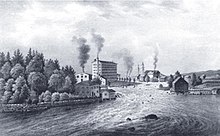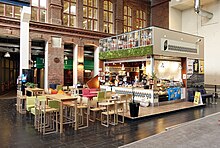Finlayson industrial area

The Finlayson industrial area is a historic industrial area in the centre of Tampere, Finland. It is located in the Finlayson district to the west of the Tammerkoski rapids, north of the Satakunnankatu street. Opposite the area to the east of Tammerkoski is the Tampella former industrial area. Neither of the areas remain in industrial use today, but many of the old industrial buildings remain in their place.
The Finlayson factory was founded in 1820 by Scottish industrialist James Finlayson. He commissioned a factory on the upper reaches of the Tammerkoski rapids. None of the original buildings commissioned by Finlayson remain to this day. Finlayson sold the factory to Carl Samuel Nottbeck and Georg Adolf Rauch in 1836. The new owners started to expand the factory.
Nowadays the area is owned by the Varma Mutual Pension Insurance Company.[1]
Kuusvooninkinen
[edit]

The oldest building is TR 1 (industrial building 1), also known as Kuusivooninkinen and also referred to as the Old factory. John Barker, specialising in modern industrial construction, took part in its design. The name Kuusivooninkinen comes from the building's six floors ("kuusi", Finnish for "six" and "våning", Swedish for "floor"), with the floors supported by cast iron pillars constructed by the Fiskars ironworks.[2] At the time of its construction it was a veritable skyscraper compared to the buildings around it. The Kuusvooninkinen building was completed in 1837. The machinery for spinning were ready by the next year. Spinning started in the building in 1839.
The Kuusivooninkinen building was Finland's first modern industrial building. This is based on its supporting structure, which was built with cast iron pillars instead of intermediary walls. The building was fitted with fire extinguishing equipment. In 1892 this was replaced with an automatic firefighting system. At the time the tower serving as the common stairway for the Kuusvooninkinen building and the adjacent TR 2 factory building was extended so that the water container of the firefighting system could be built high enough.
Other industrial buildings
[edit]

- TR 2
- TR 4 Koskitehdas
- TR 5
- TR 6 dying plant
- TR 7 Katuvapriikki
- TR 9 Seelanti
- TR 10 Plevna
- TR 15 old dying plant (dismantled in 2005)
- TR 22 Eteläturbiini
- TR 31 Puutarhatehdas
- TR 34 head office
- TR 36 steam engine
- TR 37 Siperia
- TR 48 factory shop
- TR 52 power plant
- TR 54 finishing room
- TR 57 Laappihuone (dismantled in 2003)
Chimney
[edit]The Finlayson factory chimney was built in 1899 to the Siperia factory building. The chimney is made of brick and is 65 metres high.[3]
Other buildings and structures
[edit]
- Finlayson church
- Finlayson palace
- Finlayson electric track
- Näsilinna
- Tampere garden channel
- Tallipiha
- Tampere first post office
Current situation
[edit]
Finlayson ceased textile production in the area in the early 1990s.[4] Even before that, a design competition of the future of the area was held in 1988, which was won by architect bureau 8 Studio Oy. The new zoning plan of the area was accepted by the city council of Tampere in 1995.[5]
Most of the old buildings in the area have been preserved, but they are no longer in industrial use. The Finlayson outlet store (1923) is still active at Kuninkaankatu 3.[6][7] The Finlayson area buildings now host other companies, educational institutes and museums.[4] New buildings with a total floor area of 30 thousand square metres have been built in the area, with about 800 people living in them.[5]
The Finlayson area also hosts the business centre Siperia which was opened in 2001 in the renovated premises of the old spinning hall.[8] It has over ten businesses, mostly restaurants and cafés, but also other businesses such as the entertainment centre ZBase offering laser battles. The Plevna building to the west of Itäinenkatu hosts the Finnkino Plevna movie theatre, a brewery restaurant and a parking garage. There is a pedestrian tunnel leading from the shopping centre underneath Satakunnankatu to the Frenckell square.[9] In June 2017 a Lidl grocery store was opened in the Seelanti building in the Finlayson area.[10]
References
[edit]- ^ Kohteitamme | Varma - toimitilat Archived 2017-09-15 at the Wayback Machine, Varma. Accessed on 15 September 2017.
- ^ Nikula, Riitta: Suomi teollistuu, Suomen arkkitehtuurin ääriviivat, pp. 81-84. Helsinki: Otava, 2005. ISBN 951-1-20141-7.
- ^ Heinänen, Liisa: Finlaysonin maamerkki on taas ulkoapäin kunnossa. Aamulehti, 30 July 2012, p. A08.
- ^ a b Pirkanmaan teollisuushistoria – Finlaysonin alue Archived 2007-09-30 at the Wayback Machine, Museums of Tampere.
- ^ a b Järvi, Mikko: Tammerkosken muutos ja rakennusperintö Archived 2013-09-21 at the Wayback Machine, Museum of Environment and Board of Antiquities. Accessed on 23 August 2010.
- ^ Tampereen kantakaupungin rakennuskulttuuri 1998, pp. 28–29. Tampere: zoning department of the city of Tampere, 1998. ISBN 951-609-076-1.
- ^ Finlayson-myymälä, Tampere Archived 2018-08-05 at the Wayback Machine, Visit Tampere. Accessed on 6 August 2018.
- ^ Yritysopas: Siperia, Yritysopas. Accessed on 12 September 2016.
- ^ Finlaysonin alue: Siperia Archived 2012-10-16 at the Wayback Machine, Finlaysonin alue. Accessed on 12 September 2016.
- ^ Finlaysonin alueelle tuleva Lidl avaa ovensa kesäkuussa – Näin myymälä on sovitettu vanhaan tehdasrakennukseen Archived 2017-05-23 at the Wayback Machine, Aamulehti 23 May 2017. Accessed on 23 May 2017.
External links
[edit]- Official site
- Finlayson
- Tekstiiliteollisuus 1918–1940, Koskesta voimaa
- Tekstiiliteollisuus 1940–1960, Koskesta voimaa
- Cultural track of tycoon Wilhelm von Nottbeck, cultural services of Tampere
- Children's Finlayson track: Hilma and the cotton factory, cultural services of Tampere
